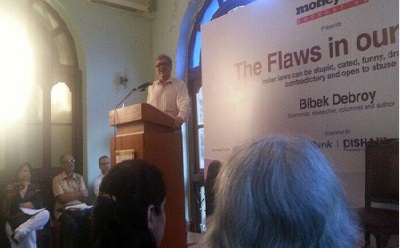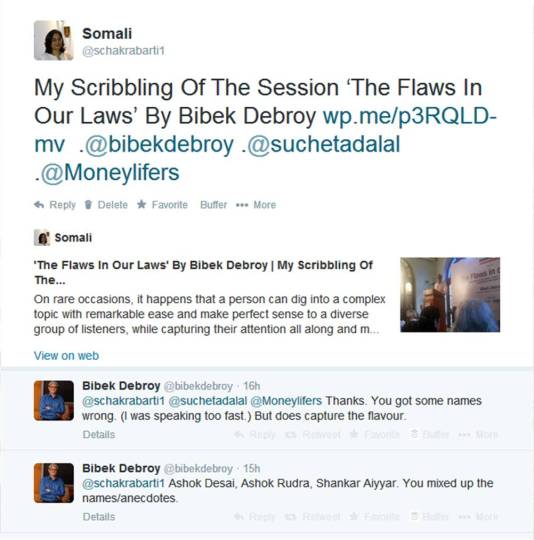On rare occasions, it happens that a person can dig into a complex topic with remarkable ease and make perfect sense to a diverse group of listeners, while capturing their attention all along and making the subject exceptionally interesting. Dr Bibek Debroy is certainly one of those people blessed with such rare ability. Fascinated by his knowledge on the vast array of subjects he tweets about, I had registered for the seminar arranged by MoneyLife Foundation, to hear Dr Debroy speak on the Flaws in Indian Laws.
I reached the Royal Bombay Yacht Club just 5 min before the start of the event. The building is just at a stone’s throw from the Gateway Of India and has an old world charm about it. With hardly any time in hand to appreciate the architecture, I rushed into the hall and yet found myself seated on a single vacant seat on the 2nd row. And there I was, all set to listen to one of the most interesting sessions by the noted economist, columnist and author.
So the session began. Right from the word ‘go’, it was replete with anecdotes that held the audience in rapturous attention and we found ourselves intermittently bursting into peals of laughter at the absurdities existing in the Indian laws. I am recollecting here some of the numerous anecdotes shared, which I had managed to scribble down.
The Trigger For Initiating A Research Project For Legal Reforms.
The 1st anecdote was about an unexpected and a seemingly innocuous event that had provided the trigger for initiating a research project by the Government Of India for Legal Reforms.
The story goes back to the year 1993. One day Dr Ashok Rudra, a scholar, economist and professor at Vishva Bharti invited Bibek Debroy for lunch to ask about his interest in heading the research project. He gave him the time between the start of lunch & dessert to make up his mind.
The project was approved by none other than our ex PM Dr Manmohan Singh, who was then, the Finance Minister Of India. Mr. Shankar Aiyar, a noted journalist analyst and author of the book ‘Accidental India’ had inadvertently provided the prompt for the project.
It happened so, that Shankar Aiyar was invited to France to speak on a conference. The per diem allowance in those days was $65. Shankar Aiyyar found the amount less and wanted his allowance to be increased to $100. He put up an application to Mr. S. Varadachary, who was then, the Joint Secretary in the Ministry of Finance. Varadachary must have seen some merit in the request, and thought it should be extended to all others as well. However, that called for making a modification to the Foreign Exchange Regulation Act (FERA). The matter was then taken to Mr Ashok Desai , the Chief Economic Consultant, who thought it made sense to scrap FERA and come up with a new version with changes in all other areas, wherever needed. He discussed the proposition with Dr Manmohan Singh, who agreed and further suggested that a research project be carried out for Law Reform to identify all areas that needed to be amended.
So began the search for a person who could undertake this project. In this context Ashok Desai contacted his friend Ashok Rudra, who then took Debroy for lunch.
Of course, the answer was yes and thus started a Project for Law Reform in collaboration with the National Law School Bangalore with support from Mr Madhav Menon, the founder-director of the law school. The Project was to continue for 4 years and resulted in many interesting findings and suggestions. How many of the suggestions were implemented, is a different question though.
With narration of this anecdote, Dr Debroy had managed to catch the attention of the listeners. He quickly moved on to the 2nd story.
The Longest Standing Litigation in India.
Anecdote No 2 was related to the longest standing litigation in India.
When Bibek Debroy started to look out for the longest standing litigation in India, he could not get any satisfactory answers to this question from any lawyer, or any pertinent information in this matter.
Finally a search in the Guinness Book of World Records revealed the longest standing litigation as one that dated back to 1205. The case was filed by a member of a certain Korat family in Ambegaon in Pune and it involved a litigation about which family branch should get the right to worship the family shrine. Spanning a period of 761 years, this certainly qualified as the longest standing litigation in the country (maybe even in the world).
As the word about this longest standing litigation spread around in the newspapers, Debroy received a letter from a certain Mr Narasimha Reddy pointing out that though the history of this dispute dated back to 1205, the dispute was with the court from 1964 to 1966 and was settled in a period of 3 years. To substantiate his claim, Narasimha Reddy mailed all records of the case, which he had personally collected, to Bibek Debroy. Amazed by his interest in digging out the facts and files pertaining to the case, Debroy asked Reddy what had prompted him to travel all the way from his residence in Hyderabad to Pune to collect the records.
The reply was equally amazing. “I have filed for the record of the longest standing dispute from 1945 – 1990, a span of 45 years to Guinness Book of World Record”, said Reddy. Obviously it was in his interest to see that no case surpassed the duration of his litigation.
Unfortunately for Narasimha Reddy, The Guinness Book had either discontinued that category of records or did not want to include any cases from India wrt this category. So he had to be content with an entry in the Limca Book of Records.
Thus stood the case of the Longest standing dispute.
We were all ears and hungry for more.
I later did a google search and found that a litigation over a disputed graveyard in Varanasi has been going on since 1878. This supersedes Mr Reddy’s record.
I stop here now to keep this post short and continue with the other anecdotes in my next post.
For the two most interesting anecdotes click on to ‘The Flaws In Our Laws’ By Bibek Debroy | My Scribbling Of The Session – Part II.
Including here comments received from Dr Bibek Debroy. I seem to have mixed up a few names.


No comments:
Post a Comment